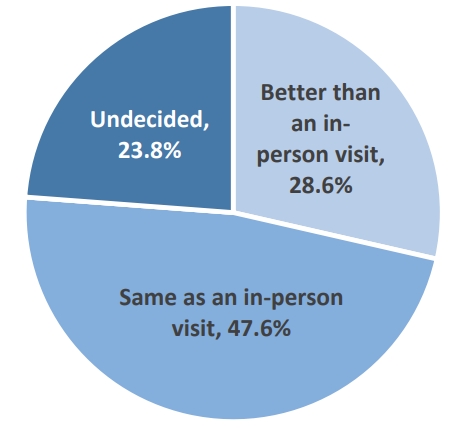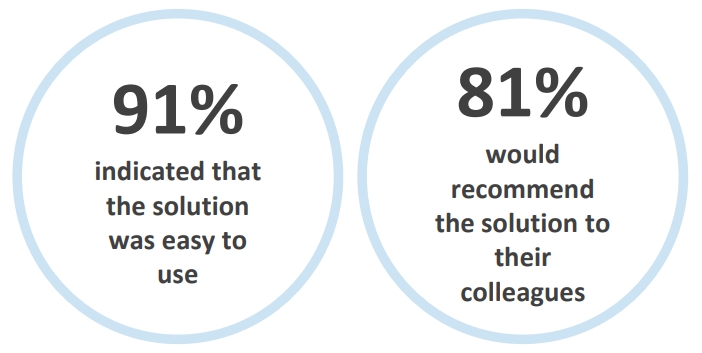Virtual Visits in Primary Care: A case study on the clinician experience
In Ontario, there is a growing demand and opportunity to innovate healthcare delivery, making it available when and where patients need it.1 Digital health tools provide an opportunity to transform the coordination and delivery of services, with the ultimate goal of improving health outcomes for patients.1 Virtual care technologies are such an example, transforming access to and delivery of care.2,3 As a core component of value-based care, virtual visits connect patients and primary care clinicians based on their communication and interaction preferences through a variety of channels. These modalities, namely secure video conferencing, audio, and/or chat messaging, complement one another to alleviate unnecessary in-person visits.3 Despite their potential benefits, less than one percent (1%) of healthcare appointments in 2018 were conducted virtually in Ontario.1
Key takeaways
Virtual visits positively impact primary care clinician experience by enabling an efficient way to communicate with patients who may not need an in-person visit.
To address this gap, the eHealth Centre of Excellence in collaboration with the Ontario Telemedicine Network deployed a virtual care solution across Waterloo Wellington, to support the delivery of virtual visits in primary care and conveniently connect patients to their primary care clinicians as illustrated in Figure 1.

Since the launch of the program in Waterloo Wellington in March 2018 until May 31, 2019:
What a fantastic tool! It has helped me to free up [in-person] visits and increase my availability to patients. I feel that the overall level of patient care is greatly enhanced with virtual visits.
Family physician
Kitchener-Waterloo
Virtual visits enabled an efficient way for primary care clinicians to communicate with their patients who did not need an in-person visit. The clinician experience survey results (n=21) illustrate numerous benefits of conducting virtual visits.
Eighty-five percent (85%, n=48) of primary care clinicians who had adopted the technology had initiated visits with their registered patients. Clinician-initiated virtual visits make up 26% of all virtual visits completed thus far (>11,100). Combined with the clinician experience survey results, this illustrates that virtual care is an accepted and efficient model of delivering primary health care, supporting enhanced patient care and alleviating unnecessary in-person visits.
I have saved a number of ER visits through this platform.
User
After a primary care virtual visit
For visits appropriate to be completed virtually, clinicians rated virtual visits as..


It does allow precise and documented advice in a way that you don’t get with in-person visits. It also does provide a lot of support to patients who need clarification or have simple questions.
User
After a primary care virtual visit
- Devlin, R. et al. (2019). Hallway Health Care: A System Under Strain. 1st Interim Report from the Premier’s Council on Improving Healthcare and Ending Hallway Medicine.
- McGrail, K. M., Ahuja, M. A., and Leaver, C.A. (2017). Virtual Visits and Patient-Centered Care: Results of a Patient Survey and Observational Study. Journal of Medical Internet Research, 19(5).
- Jamieson, T. et al. (2015). Virtual Care: A Framework for a Patient-Centric System. Women’s College Hospital Institute for Health Systems Solutions and Virtual Care (WIHV).
Interested in learning more?
Interested in partnering with us or learning more about
what we can offer you? Please reach out here.
Get the latest resources and insights
-

A case study on a clinic’s experience using Online Appointment Booking for cervical cancer appointments and reminders for patients
Preventative care is a pillar of primary health care. Since the 1980s, there has been…
-

How AI Scribes are reducing administrative burden in primary care
Learn more about an evaluation that shows AI scribes are alleviating the administrative burden on…
-

eReferral and wait times to access DI services
The use of eReferral for diagnostic imaging (DI) orders enhances workflow efficiency, supporting faster processing…
-

Webinar on improving access and experience of care for patients
Sharing some tips, tricks, and key takeaways from our Ideal Primary Care Practice Model webinar,…